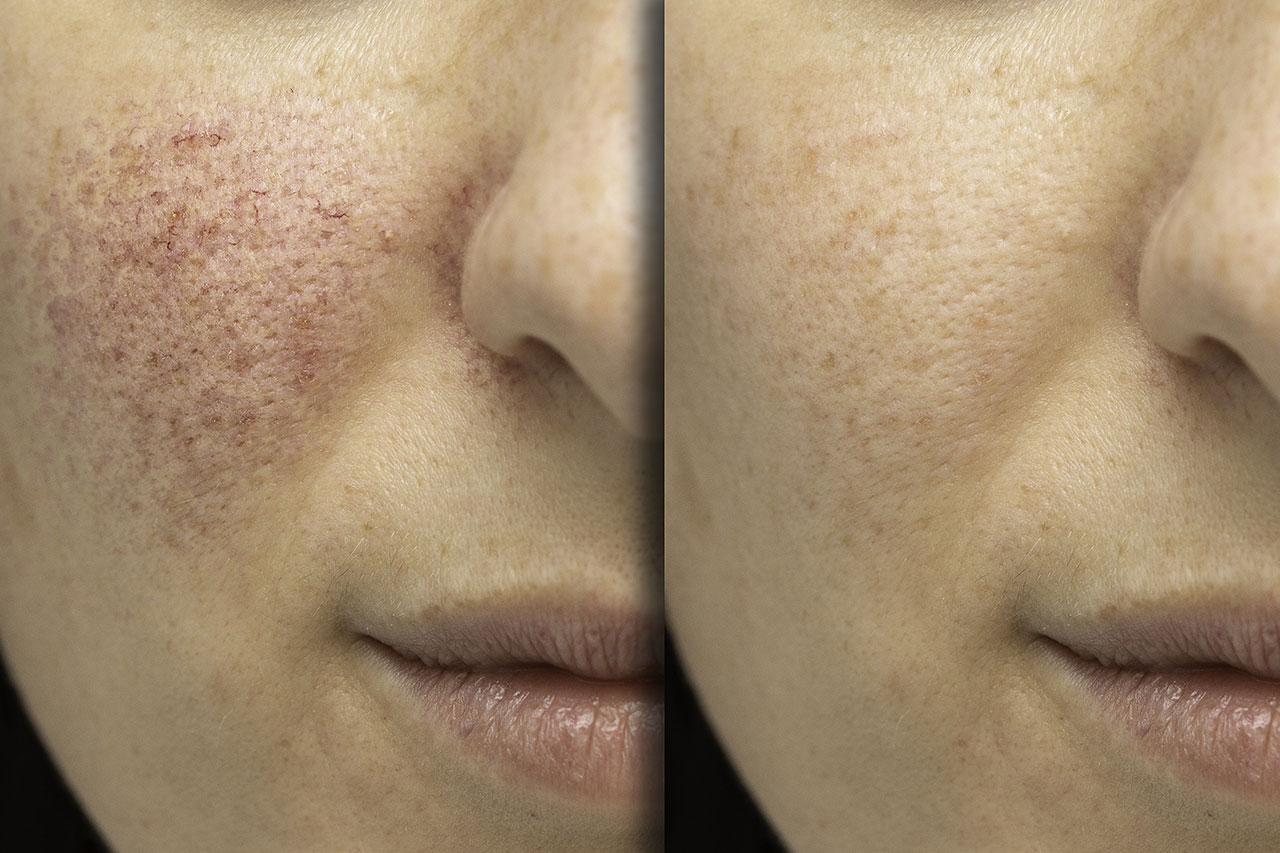Rosacea is a skin disorder that produces flushing and prominent blood vessels in the face. Small pus-filled lumps may also appear. These clinical manifestations may appear and disappear over weeks to months. People often misdiagnose rosacea as acne, other skin conditions, or normal ruddiness.
Rosacea may strike anybody at any time. It is more frequent among middle-aged Caucasian women, though. Rosacea has no known treatment. Doctors can still use treatments to regulate and minimize the indications.
What Should You Know About Rosacea?
If your face looks flushed and you have acne-like pimples, you may have rosacea, a skin disorder. To control your problems, your doctor might prescribe drugs and other therapies. Similarly, there are several things you may do to improve your appearance and self-esteem.
The Symptoms
Rosacea is an inflammatory skin disorder that lasts for a long time. The face is usually affected in this condition. People often misdiagnose rosacea as acne, eczema, or a severe allergic response. Similarly, rosacea is characterized by face flushing, inflamed skin, and pimples. Other signs and symptoms include flushing easily and vision issues. Here are the topmost signs and symptoms of rosacea:
- Blushing or Flushing of the Face: Rosacea can create flushing or redness in the center of your face. This symptom of the disease may be difficult to detect on darker pigmentation.
- Visible Veins: Small blood capillaries in your cheeks and forehead burst and become apparent, resulting in visible veins (spider veins).
- Swollen Bumps: Many people who have rosacea get acne-like blemishes on their faces. Pus may be present in these lumps.
- Fiery Sensation: The afflicted area's skin may feel heated and painful.
- Problems with the Eyes: Dry, itchy, and puffy eyes and eyelids are common rosacea symptoms. Ocular rosacea is the name for this condition. Eye symptoms may appear before skin symptoms in some persons.
- Nose Enlargement: Rosacea thickens the skin of the nose over time, making it seem bulbous (rhinophyma). Males are more likely than women to experience this.
The Causes
Rosacea has an unclear etiology. However, it mightbe the result of a hyperactive immune response, genetics, environmental causes, or a combination of these factors. Rosacea is not infectious and is not a result of improper hygiene. The specific etiology of rosacea is unknown to doctors. The following are a few factors that might play a role:
- Genes: Rosacea is a condition that typically runs in families.
- The Trouble with Blood Vessels: Problems with the vascular system in your face might be causing redness on your skin. They may get broader as a result of sun damage, making them more visible to others.
- Mites: They're really little insects. Demodex folliculorum is a kind that dwells on your skin and is typically harmless. On the contrary, some people have a higher sensitivity to mites or get more of them than typical. Your skin may get irritated if you have too many mites.
- Bacteria: pylori is a kind of bacteria that typically dwells in your stomach. According to some research, this bacterium might make your skin flush by increasing the level of gastrin, a digestion hormone.
The Treatments
There is presently no treatment available. Various therapies, on the other hand, can help to alleviate the discomfort of rosacea. Moreover, the symptoms may worsen over time if not treated. The best benefits are usually a result of a mix of drugs and lifestyle adjustments. The following are the most effective rosacea treatments.
Skin Creams
Inflammatory conditions and skin discoloration can be reduced with the use of skin creams. Doctors may advise that you use them once or twice a day. Topical antibiotics, retinoid, benzoyl peroxide, and azelaic acid are among the examples. A doctor may also advise you to use cosmetics to hide flaws on your skin.
Eye Drops
Ocular rosacea causes eye problems, which can be relieved with eye drops. As a result, a doctor may prescribe blephamide, a form of eye drop. Similarly, they could prescribe it for a few nights to a week, with a break or tapering use in between.
Antibiotics
Antibiotics used orally have anti-inflammatory properties. They are more likely to have faster benefits than topical ones. Tetracycline, doxycycline, and amoxicillin are among examples. Antibiotics called tetracyclines can assist with eye issues. Doxycycline can assist with dryness, irritation, impaired vision, and photosensitivity in those with ocular rosacea.
Isotretinoin
In severe instances of rosacea, patients use isotretinoin (Accutane), an oral medicine. This is a strong medication that stops the skin from producing oil. It is quite effective in the treatment of rosacea.
Laser Treatments
Specialists can utilize laser therapy to help minimize telangiectasia or visible vasculature. The doctors shrink these vessels with strong pulsed light in this therapy. The surgery may cause some discomfort.
However, the majority of people will not require anesthesia. Bruising, skin scabbing, inflammation, soreness, and infection are all possible side effects of laser therapy. A cosmetic surgeon can help a person reduce thicker skin that has formed as a result of rosacea.

Why Should You Trust Med Aesthetic Cosmetic Laser Center for Rosacea Treatment?
Rosacea is an inflammatory skin disorder that lasts for a long time. Face flushing, skin thickness, and eye problems are some of the signs. You can use medications to address the symptoms, even though there is presently no cure. Home cures can also be beneficial. Similarly, you can discuss any concerns concerning rosacea with a doctor. Therefore, Med Aesthetic Cosmetic Laser Center can help you.
Our expert doctors can sit down with you to identify the root cause of your condition. Similarly, they can also offer a tailored treatment plan per your condition. Once you give us the green signal, we will move forward with the procedure. With years of useful medical experience, we only offer the safest approaches.


